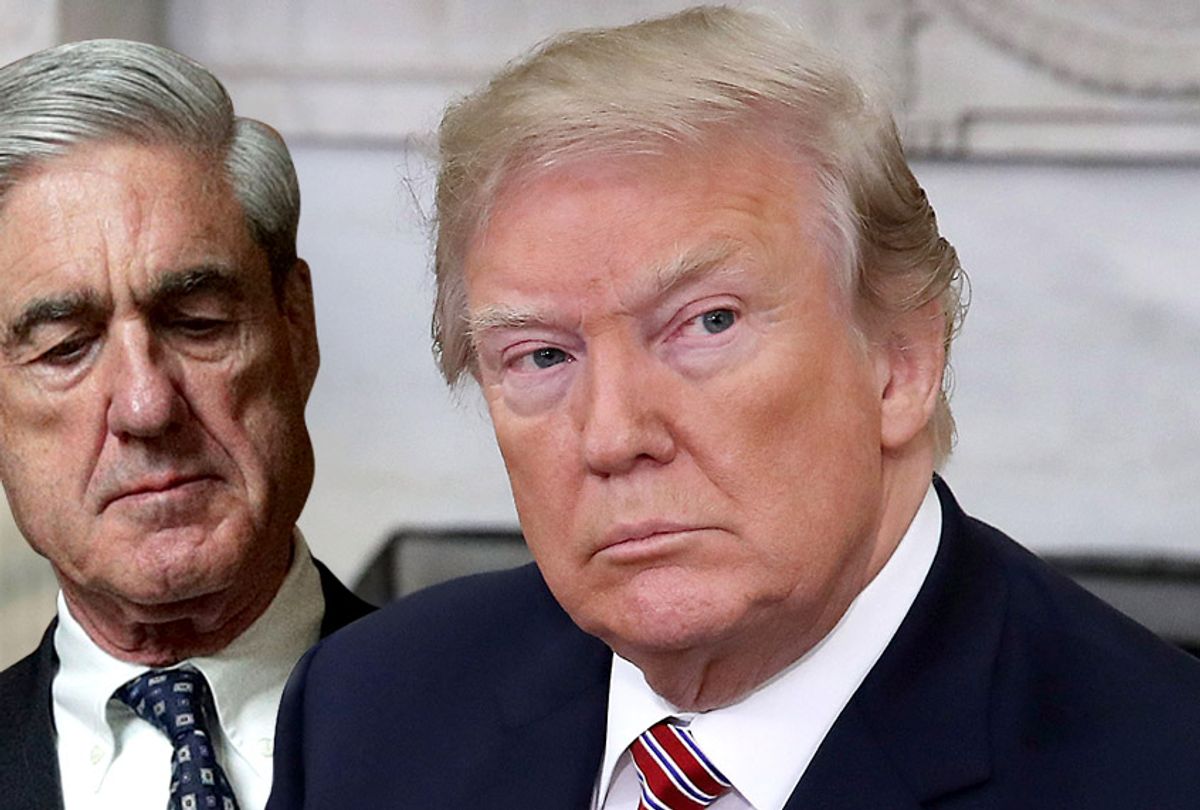Late last week, when explaining why President Donald Trump shouldn't meet with Special Counsel Robert Mueller, National Review pundit Rich Lowry penned an editorial that implicitly argued Mueller's investigation couldn't be trusted because it had gone beyond the scope of focusing on alleged collusion with the Russian government.
Lowry's main claim was that Mueller was overstepping his bounds because we, the American people, don't really know what he wants from the president.
Trump lawyer John Dowd reportedly quit over the dispute, and he was right. Trump shouldn’t walk into the same room with Mueller. He shouldn’t say “hello” to him. He shouldn’t follow him on Instagram or Twitter. He should treat him as an adversary who, even if he isn’t conducting “the witch hunt” that Trump alleges, would certainly be happy to nail him for the slightest misstatement.
Mueller was supposed to be conducting a counterintelligence investigation into Russian meddling, which immediately also became an investigation of obstruction of justice. Trump’s attitude should be, “Come and get me, copper — if you have a case for obstruction, make it, but I’m not incurring any additional legal jeopardy by sitting down and talking to you."
Since that column, the FBI raided Trump attorney Michael Cohen's office, seeking records on the infamous "Access Hollywood" tape in which Trump bragged about committing sexual assault — and the fallout; just minutes later, a batch of emails from the Hillary Clinton campaign was released on WikiLeaks, diverting attention. Mueller's investigation once seemed to be finding out if the president and his campaign had colluded with a foreign power to win the 2016 election, but now it seems to be about everything from an alleged affair with a porn star and the possibly illegal payments which covered it up to other alleged payments to women. This has left the public understandably confused about what exactly is going on.
So should Mueller tell the country what he's looking for? According to experts who spoke to Salon, the answer is no.
"Part of the point of an investigation is that you're following the facts and the implications to where they lead" John Wonderlich, executive director of the Sunlight Foundation, told Salon. "So to say the public deserves to know where it's going would be to presuppose that there is some outcome in mind rather than a merit-based process of investigation based on standards and procedures prescribed in the law."
Jesse Franzblau, a policy analyst at Open The Government, had a similar observation.
"From a transparency perspective, there is a lot that the public has the right to know, particularly about the investigation into potential foreign influence into the election," Franzblau told Salon. "Obviously there is an enormous public interest there. But there are definitely a lot of legal bounds that the special counsel is not able to disclose a lot of information to the public, for obvious reasons. There is grand jury information, there is a lot of sensitive evidence information collected through sensitive means. There are definitely a lot of restrictions and the special counsel's mandate is actually quite restrictive in terms of what he's able to do in terms of producing information, even to Congress."
He added, "It's not like the structure under Ken Starr's investigation [of President Bill Clinton], where that type of investigation they were actually required to produce a report to Congress."
If anything, the main concern that both transparency advocates had wasn't that Mueller's opacity reflected poorly on him. Instead they were worried that, if Trump decides to fire Mueller in order to protect himself, all of Mueller's research — including revelations that may have proved that the president broke the law — could get lost or deliberately destroyed.
"Now you actually have members of Congress moving to introduce legislation to mandate that the special counsel issue a report, in the case that the special counsel is fired, that they have to issue a report two weeks later directly to Congress about the status of the investigation, with the intent to make sure that the information gathered is preserved and make sure things aren't lost," Franzblau told Salon. "There certainly is a lot of concern when you have a very high level investigation, investigating the highest levels of power, there is obviously concern."
When it comes to the long-term impact of the Mueller investigation, the stakes for American democracy couldn't be higher. Regardless of whether one feels that Trump colluded with Russia, illegally silenced women who could derail his campaign or broke the law in any other way, the rule of law depends on the notion that the president be held as accountable for his actions as any other citizen. The drastic expansion of the scope of Mueller's probe ought to raise eyebrows — both because of what it implies about Trump's potential crimes and because it goes well beyond what the public believed was being scrutinized — but the reality is that America will be best served if the precedent is set that a president must obey the law, not that the law must accommodate the president.
Fortunately, it seems like most Americans agree with that idea. Sixty-nine percent of American voters, including 55 percent of Republicans, told a recent Quinnipiac poll that Trump should not fire Mueller, even though Republicans are far more likely than the rest of the country to think that the questions about Trump are overblown or motivated by partisanship. It may not be ideal for the nation to watch with bated breath as each new headline drops about Mueller, wondering if it will soon be conclusively revealed that our president committed treason or broke the law in some other way, but that is better than a president engaging in corruption and being able to get away with it.



Shares